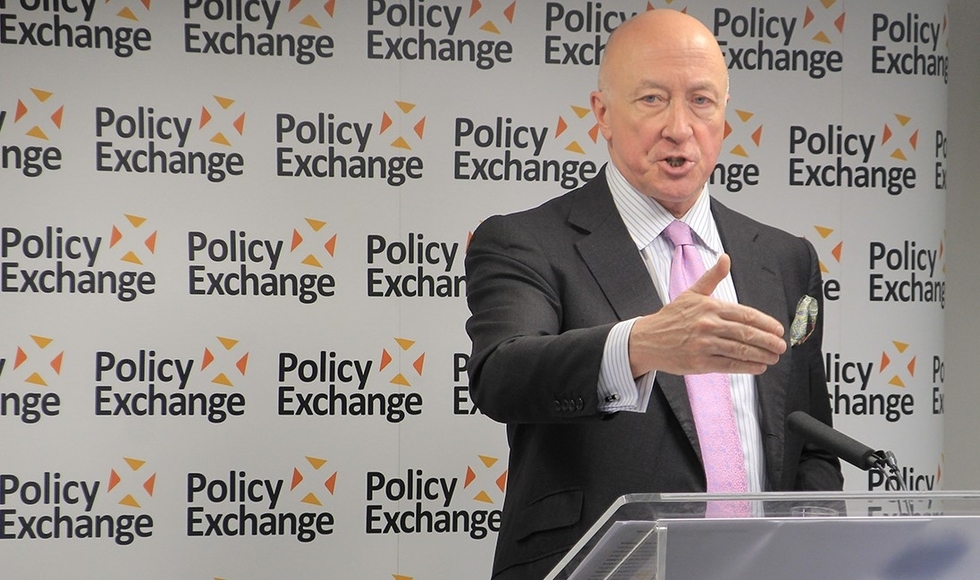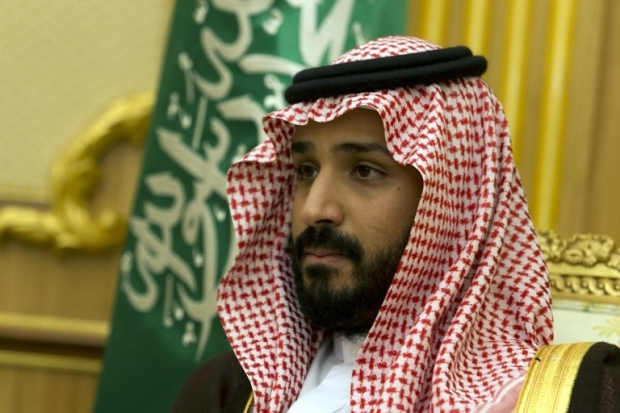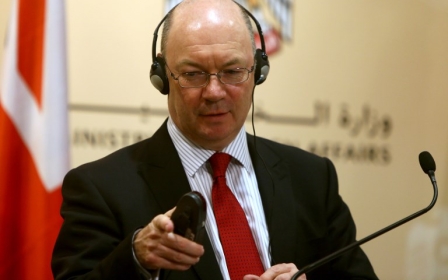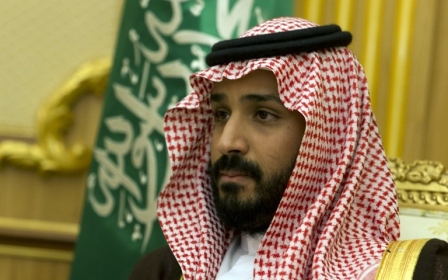From 'our man in Riyadh' to apologist for Saudi purge

The project to establish Crown Prince Mohammed bin Salman as a Middle Eastern strongman has a dubious collection of mainly Western backers.
They include financiers with an eye on the Aramco billions, Israeli Prime Minister Benjamin Netanyahu, Mohammed bin Zayed of Abu Dhabi, the Trump family, ex-generals, spies, oilmen, unscrupulous PR fixers and a galaxy of bought and paid-for journalists who ought to be ashamed of themselves.
Positive narrative
Until last week however, bin Salman had lacked a theorist. There has been no equivalent of Soviet Russia's Mikhail Suslov, an eminent intellectual capable of explaining away the crimes of the regime and placing events within a positive narrative.
Ladies and gentlemen, can we have a generous round of applause, please, to welcome the arrival of Sir John Jenkins, the former British ambassador to Saudi Arabia!
Sir John's speech can be boiled down to some very old-fashioned sentiments indeed. The Arabs can't be trusted with democracy. Best to stick with the House of Saud because they are on our side and will do what we want.
Sir John, who was regarded as the foremost Arabist of his generation at the British foreign office, this week emerged as the Western world's most-learned apologist for bin Salman's Saudi Arabia.
In a speech delivered this week at Policy Exchange, the neoconservative think tank, Sir John set out the historical, intellectual and above all the moral reasons for supporting bin Salman's version of the Saudi monarchy.
Until now bin Salman has made his case through brute force, prison cells, torture chambers and most of all through a big fat chequebook. Sir John Jenkins advanced his case for bin Salman on a higher plane. It involved long words, complex sentences, a great deal of academic name-dropping, and a distinguished central London audience.
To give a flavour, here's a typical sentence from Sir John's speech:
"Our own fantasies are of transformed and benign Shia Islamist rule in Iran and Sunni Islamist acceptance of pluralist politics, the Rawlsian veil of ignorance, the Habermasian version of unprejudiced political debate in a liberal agora and of a region where the biggest challenges are not absolutist ideologies but illiberal state security structures. Yet successful electoral democracy requires the development of sustained habits of mind and social practices, a culture of civility and a shared sense of the past and the future."
All clear? No? Don't worry. There's no need to panic. I've read Sir John's speech so that readers of Middle East Eye don't need to do so.
Cut out the show-off name dropping and look-at-me academic jargon, and Sir John's speech can be boiled down to some very old-fashioned sentiments indeed.
Colonial thinking
Don't believe me? Here’s what Sir John also had to say:
"But elections there continue for complex reasons to produce tribal, reactionary, sectarian and unstable governments. As a result, it is lifestyle liberals and the rulers of prosperous Gulf states who tend not to want elections. The latter have been more successful in material terms over the last 30 years and at least one has become a more attractive model for young Arabs than any other state or set of states in the region.
They also work as state actors within state systems and mostly accept the same premises as we do about the conduct of external relations. Islamists in contrast have been a disaster, mistaking ideational coercion and social provision for ideological consent."
Once again let's translate Sir John's long-winded academic oratory into English prose.
Sir John launched his defence of bin Salman in a dreadful week when the United Nations warned of famine-like conditions unfolding in areas of Yemen as a consequence of the Saudi-led blockade
His thesis is wearily familiar and could have come from the mouth of any British colonial official from the mid 20th century.
Your ordinary Arab can't be trusted with the vote. Give him free elections and he might support the wrong chaps. That would never do!
No surprise then that the Jenkins event was chaired by Tom Tugendhat, the latest establishment protege who is the new chairman of the UK's Foreign Affairs Committee, and tipped as a future prime minister.
The Jenkins speech was an attack on Iran (Shia Islamism) and the Muslim Brotherhood (Sunni Islamism). Sir John argued that only nation states such as Saudi Arabia and its Gulf allies came close to sharing the values and served the interests of the West.
Substantial omission
I have dealt with Sir John Jenkins from time to time and have always found him helpful and courteous.
So here is some friendly advice as he embarks on his new career as a revered public intellectual making pronouncements about Islamism, the nation state, Iran, Saudi Arabia, the contemporary Middle East, etc.
Sir John would do well to remember that intellectual honesty is even much important than the right academic phraseology.
Yet Sir John failed to address the terrible war in the Yemen, which has claimed many thousands of civilian lives, mainly at the hands of the Saudi-led system which Sir John supports.
Free from influence?
This was not the only substantial omission from Sir John's speech.
There was no reference at all to bin Salman's imprisonment of leading members of his family or reports of their torture and beatings, nor to the way in which he has demolished alternative power centres in Saudi. This surely is a matter of deep relevance.
I now turn to my second piece of advice for Sir John. I know him well enough to be certain that he is a man of total intellectual integrity. Others do not. That is why it is important that he should be seen to be free from influence.
Since leaving the foreign office Sir John has held a senior position at the International Institute for Strategic Studies (IISS), a think tank which specialises in the Middle East.
The IISS describes itself as a "non-partisan organisation, independent of government and other bodies". However, as I demonstrated in this article for MEE, there is no doubting the closeness of its connection to Bahrain, which is a core part of the Saudi circle of influence in the Gulf.
Next month, the IISS will host its annual Manama Dialogue security summit at the Bahraini capital's Ritz-Carlton hotel, whose sister hotel in Riyadh is currently being used as a detention and interrogation facility by the Saudi government.
Asked to comment on reports of torture and beatings taking place within its facilities, a spokesperson for the Marriott International hotel group told MEE that the Ritz-Carlton and the neighbouring Courtyard hotel were "not operating as traditional hotels for the time being".
I would imagine that Sir John could depend on a perfectly decent pension from the foreign office.
Some – though not me – would question the purity of his judgments while he appears to be working as an executive director of an organisation with such close connections with Bahrain.
So before going into print I put this point to Sir John, who responded in his usual honesty: "I worry myself about the way that influence is exerted not simply in what those - including myself - who work in organisations that receive outside funding (which quite honestly is almost everyone these days) say; but also what they don’t say.
"On the other hand I will not say something that I don't believe. And so far I have not had to keep silent about something about which I’d like to speak."
Britain's reputation
Sir John also said he will soon be severing his ties with the IISS, and was already essentially "semi-detached" from the organisation, having also taken up a position at Yale University in the US.
Although the IISS's website still describes him as "Executive Director, IISS-Middle East," he said he had agreed to work for the think tank for 48 days this year as a "Corresponding Director".
"At the end of this year I and they are no longer an item at all," he wrote.
I am relieved to hear it. Many wonder why Britain's reputation has declined across the Arab world in recent decades.
Part of the reason is that too many of our former diplomats have put their knowledge and learning at the disposal of commercial organisations or national governments. This means they become open to the charge of have becoming advocates rather than scholars who can be trusted by all sides.
If Britain is to be trusted once again in the Middle East, our Arabists must be seen as independent men and women who can speak truth to power. Meanwhile the bin Salman project goes from strength to strength.
Let's hope and pray it's as benign as its backers claim.
- Peter Oborne won best commentary/blogging in 2017 and was named freelancer of the year in 2016 at the Online Media Awards for articles he wrote for Middle East Eye. He also was British Press Awards Columnist of the Year 2013. He resigned as chief political columnist of the Daily Telegraph in 2015. His books include The Triumph of the Political Class, The Rise of Political Lying, and Why the West is Wrong about Nuclear Iran.
The views expressed in this article belong to the author and do not necessarily reflect the editorial policy of Middle East Eye.
Photo: Sir John Jenkins during a speech at the Policy Exchange (Courtesy of Policy Exchange)
New MEE newsletter: Jerusalem Dispatch
Sign up to get the latest insights and analysis on Israel-Palestine, alongside Turkey Unpacked and other MEE newsletters
Middle East Eye delivers independent and unrivalled coverage and analysis of the Middle East, North Africa and beyond. To learn more about republishing this content and the associated fees, please fill out this form. More about MEE can be found here.







